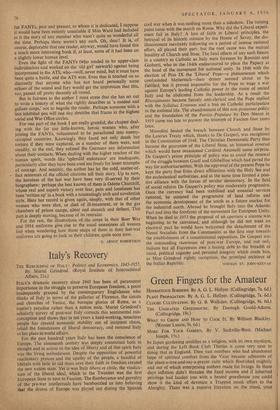Italy's Recovery
ITALY's dramatic recovery since 1945 has been of paramount importance in the struggle to preserve European freedom, a point inadequately grasped by the contemporary Englishman who thinks of Italy in terms of the galleries of Florence, the canals and churches of Venice, the baroque glories of Rome, as a tourist's paradise rather than a nation state. Muriel Grindrod's scholarly survey of post-war Italy corrects this sentimental mis- conception and shows that in ten years a hard-working, tenacious people has created economic stability out of incipient chaos, relaid the foundations of liberal democracy, and restored Italy to her place in world affairs.
For the past hundred years Italy has been the conscience of Europe. The nineteenth century was deeply committed both in thought and in action to the idea of liberty and of this spirit Italy was the living embodiment. Despite the opposition of powerful reactionary princes and the apathy of the people, a handful of liberals with little to aid them save their faith in freedom created the new nation state. Yet it was Italy libera et civile, the vindica- tion of the liberal ideal, which in the Twenties was the first European State to turn to Fascism. The flamboyance and garrulity of the pre-war intellectuals have bamboozled us into believing that the drama of Europe was played out during the Spanish civil war when it was nothing more than a sideshow. The turning point came with the march on Rome. Why did the Liberal experi- ment fail in Italy? A loss of -faith in Liberal principles, the betrayal of its historic mission by the House of Savoy, the dis- illusionment inevitably following on a period of intense national effort, all played their part; but the root cause was the mutual hostility of Church and State. The fatal effects of any such fissure in a country as Catholic as Italy were foreseen by Rosmini and Gioberti, who in the 1840s endeavoured to place the Papacy at the head of the movement for national unity. In 1846 with the election of Pius IX the 'Liberal' Pope—a phenomenon which confounded Metternich—their dream seemed about to be fidfilled, but it proved impossible for the Pope to wage a war against Europe's leading Catholic power in the name of united Italy and he abdicated from the leadership. Asa result the Risorgimento became fiercely anti-clerical and the Pope replied with the Syllabus Errorum and a ban on Catholic participation in the national life. The abandonment of this non possumus policy and the foundation of the Partito Populare by Don Sturzo in 1919 came too late to prevent the triumph of Fascism four years later.
Mussolini healed the breach between Church and State by the Lateran Treaty which, thanks to De Gasperi, was recognised in the Constitution of 1948. The Christian Democratic Party thus became the guarantee of the Liberal State, an historical reversal which would have occasioned Cardinal Antonelli some surprise. De Gasperi's prime principle of policy was to avoid the renewal of the struggle between Guelf and Ghibelline which had paved the way for authoritarianism. With the approval of the present Pope he kept the party free from direct affiliations with the Holy See and the ecclesiastical authorities, and at the same time formed a posi- tive alliance with the forces of secular democracy. In the field of social reform De Gasperi's policy was moderately progressive. Once the currency had been stabilised and essential services restored, he initiated the programme of land reform and the economic development of the south as a future market for the industrial north. Abroad he brought Italy into the Atlantic Pact and into the forefront of the movement for European Unity. When he died in 1953 the proposal of an apertura a sinistra was beginning to be canvassed, and although he did not want an electoral pact he would have welcomed the detachment of the Nenni Socialists from the Communists as the first step towards the establishment of a constitutional opposition. De Gasperi was the outstanding statesman of post-war Europe, and not only Italians but all Europeans owe a lasting debt to the breadth of mind, political sagacity and personal integrity which made him, as Miss Grindrod rightly recognises, the principal architect of


































 Previous page
Previous page